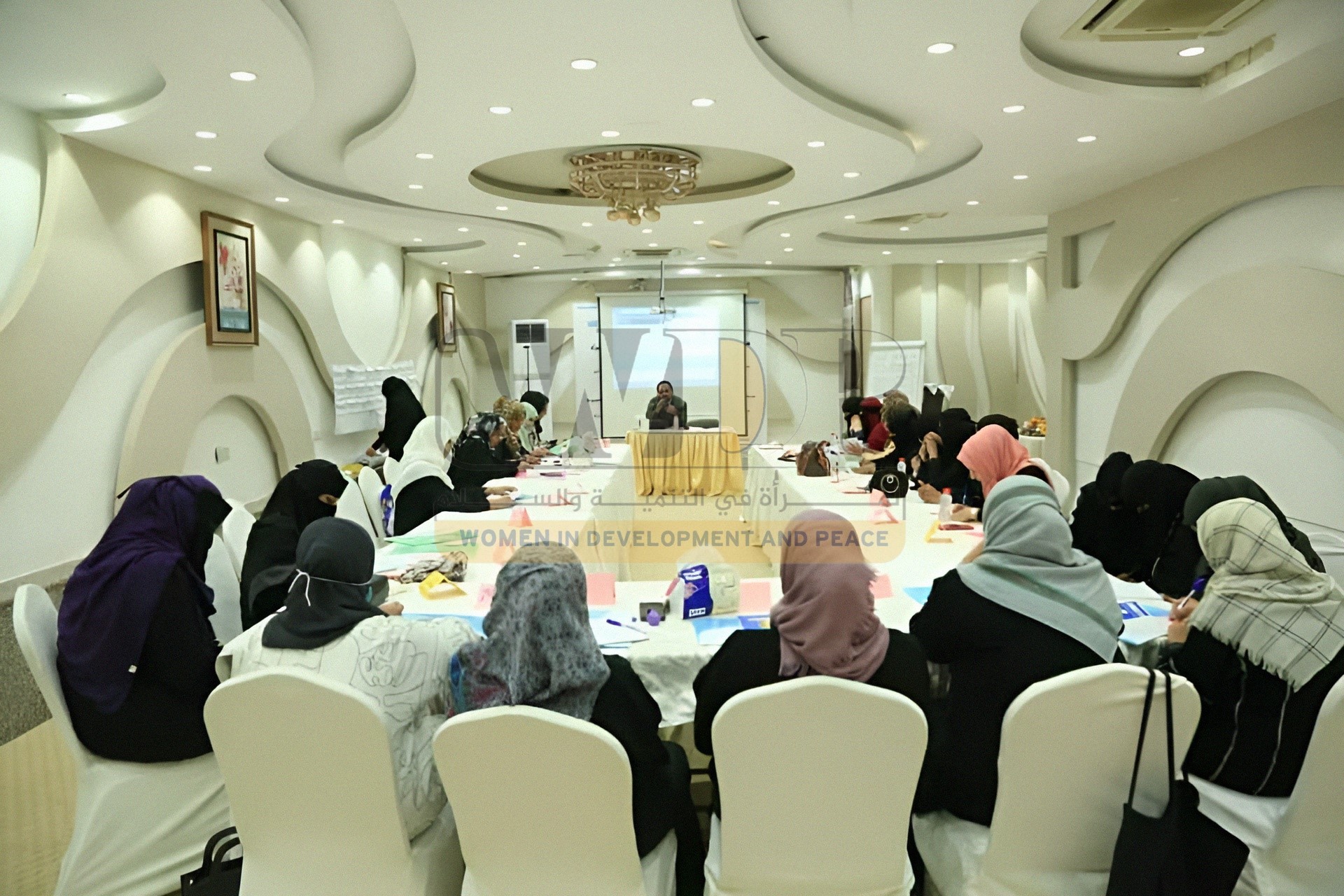Women in Development and Peace – Hebah Mohammed
Businesswomen in Yemen are a vital part of the economic force and the real engine for sustainable development, as they strive hard to achieve success and prosperity in an economic environment that has its challenges and opportunities, amid difficult economic conditions. The role of official entities is of great importance in empowering businesswomen and supporting them to achieve success and sustainable growth.
Official Entities and Women’s Economic Activity
The roles played by official entities in facilitating business and procedures for businesswomen in Yemen vary, as some say they play a fundamental role in providing services and facilities for women’s businesses and others, while others say that the challenges facing businesswomen are much greater than they appear in reality. Khawla Al-Iryani, Director of Businesswomen at the Chamber of Commerce in Ibb Governorate, says: “The Chamber of Commerce plays a vital role in empowering Yemeni businesswomen and supporting their economic activities. As the Director of Businesswomen at the Chamber of Commerce, I work alongside employees to provide facilities and services that enhance the success of businesswomen and contribute to the development of their businesses.”
She adds: “Business cards for businesswomen are one of the measures we offer to facilitate their commercial activities; these cards offer many benefits, including identifying them as professional businesswomen and enhancing their credibility in the market. We pay special attention to processing requests for issuing cards quickly and efficiently so that working women can immediately benefit from this opportunity.”
She further states: “In addition, we provide support to businesswomen in obtaining business passport cards, which enhances their status and impact in the business arena. We work on simplifying procedures and providing the necessary guidance for them to easily obtain professional passports.”
Emphasizing the importance of providing necessary assistance to businesswomen in dealing with legal aspects related to their businesses, including communication and interaction with other offices and relevant government entities, the Chamber of Commerce is keen on providing legal advice and necessary guidance to ensure successful projects and compliance with legal requirements.
On the other hand, Jawahir Ali, Manager of the Union’s Microfinance Program, says: “Official entities such as the Social Fund, in addition to community organizations, play an important role in supporting businesswomen and empowering them for success and continuity. These entities provide training and qualification for businesswomen to develop their skills and enhance their practical capabilities, while exhibitions and bazaars contribute to promoting women’s entrepreneurship and providing platforms for showcasing and marketing their products and services.”
She continues: “On the other hand, the program we manage provides easy financing to support businesswomen in implementing their activities, and this program also includes conducting feasibility studies for their projects to identify capital needs and evaluate their ability to sustain work. We work alongside businesswomen to help them achieve their financial goals and sustainable success.”

Dr. Fawzia Nashir, President of Businesswomen in Yemen, shares: “Recently, there has been an increasing interest from official entities in Yemeni businesswomen, indicating a state direction to support and enhance the businesswomen’s sector.”
Meanwhile, Sara Salam, a researcher in economic empowerment and women’s trainer, points out that official entities play an important role in supporting businesswomen by providing the necessary training and qualifications for them, facilitating the required procedures for working women, and offering specific services aimed at supporting women and project owners. However, they still need to increase productivity by using modern methods and applying clear strategic plans.
Facilitative Fees and Future Decisions
As part of providing facilitations for businesswomen, Nashir says: “The Ministry of Commerce and Industry is issuing several decisions aimed at facilitating the process of registering projects for businesswomen. These decisions also aim to grant women many exemptions in fees that were previously imposed. And it doesn’t stop there; there are still other upcoming decisions aimed at supporting businesswomen and empowering them in their entrepreneurial journey.”
Regarding the policies and procedures adopted by the ministry to encourage female participation in freelancing, Nashir pointed out that the Ministry of Commerce and Industry adopts multiple policies and procedures to encourage female participation in freelancing.
She added: “Exemptions from fees and facilitations are among the most important policies that promote the activities of businesswomen and contribute to expanding their freelancing businesses and engaging them in the labor market. These measures provide the necessary financial support and administrative facilitations for women who want to start or expand their freelancing projects, thus enhancing the role of women in the economy and achieving sustainable development.”
She also stated that the Ministry of Commerce and Industry and the Chamber of Commerce in Yemen offer many programs and initiatives aimed at training and empowering businesswomen. These programs include capacity building in various fields, including marketing and business management. According to Nashir, the ministry and chambers organize various competitions aimed at enhancing competition and encouraging excellence among Yemeni businesswomen.
She confirms that the chambers are the ones that remove all obstacles and needs facing businesswomen, being the entity that always listens to the voices of businesswomen and interacts with their issues.
Also, according to Nashir, the chambers provide assistance and guidance regarding the challenges related to starting and operating businesses, including legal, financial, and marketing advice. They also contribute to providing business opportunities and enhancing communication and collaboration among businesswomen, thereby promoting sector development and enhancing the role of women in the economy.
Lack of Government Support
In 2018, Wafa Ali Al-Jabri emerged as a famous businesswoman in Yemen, known by the title “Mother of Daughters.” Wafa works as an employee in the field of social affairs and labor, and she has a project aimed at training women and empowering them to integrate into the labor market and achieve self-sufficiency.
Wafa lives with her family in Al-Khusaf area in the city of Aden, which is a poor and marginalized area that needs many services to achieve its vision; therefore, she sought help from official authorities, such as the Ministry of Commerce and Finance, but she did not find any real support. Despite her attempts to open a small training center, she faced difficulties in paying fees and taxes, as she had no significant financial income. Wafa finds it difficult to obtain support from official authorities, as there are no initiatives, training programs, or exhibitions that target and support her in her field of work. According to Wafa, support is limited to specific individuals, except for the Chamber of Commerce, which offered a reduction in fee payment. In addition to facing an increase in commercial registry fees and being affected by the country’s security situation, Wafa struggles to maintain the sustainability of her project and confront the challenges of the fluctuating economy.
Challenges and Enhancing Capabilities
Regarding the challenges, Nashir says: “Problems and difficulties often arise as a result of traditional and routine procedures, for example, in the process of registering projects. Many businesswomen remain outside the organized economy due to these obstacles.”
She added: “Among the challenges are the policies of banks that impose high-interest rates on loans. Emerging businesswomen also face a lack of experience in market research compared to businessmen, and the business environment lacks incubators that provide consulting, training, and project development services. In addition, there is a lack of active databases and platforms that serve businesswomen.”
Regarding the necessary steps to raise awareness about the importance of supporting businesswomen, Nashir indicates that these steps include improving the efficiency of women and developing their skills and abilities through programs that enhance the growth and development of their projects, and coordinating the efforts of businesswomen with different stakeholders to overcome the obstacles that hinder their development, whether related to financing, marketing, consulting, or other obstacles that hinder the growth of businesswomen in Yemen, especially owners of small businesses.
Jabari commented, saying: “To empower Yemeni women in the business sector, there must be an incubator from the Ministry of Commerce and Finance to support women who want to start and develop their projects. Specialized training programs and financial support should be provided to reduce fees and taxes, and cooperation between the public and private sectors should be enhanced.”

